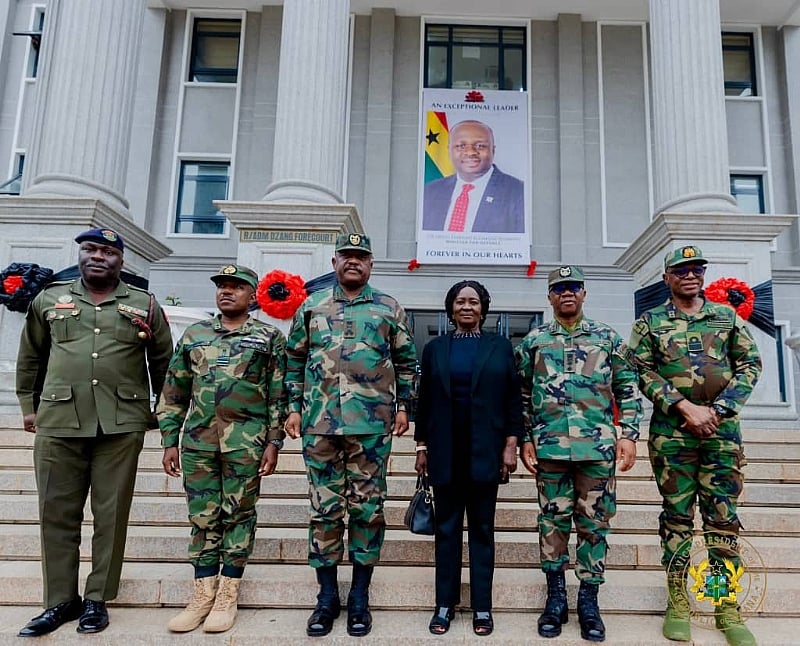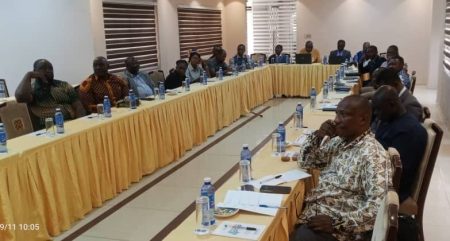The Ghana Armed Forces Council convened an emergency meeting on Friday, August [insert corrected date if 2025 is incorrect], to address the tragic military helicopter crash that occurred in Sikaman, Adansi Akrofuom, Ashanti Region. The crash, a devastating incident with potential implications for national security and morale within the armed forces, prompted the immediate gathering of the council. Presided over by Vice President Professor Naana Jane Opoku-Agyemang, the meeting served as a critical platform for assessing the circumstances surrounding the crash, evaluating its impact, and formulating immediate responses and long-term strategies to prevent future occurrences. The meeting’s agenda also included broader discussions on pressing issues concerning the Ghana Armed Forces, underscoring the council’s commitment to comprehensive oversight and strategic planning for the nation’s defense and security apparatus.
The somber atmosphere of the meeting reflected the gravity of the helicopter crash and its human cost. The council expressed profound sorrow and solidarity with the families affected by the tragedy, recognizing the irreplaceable loss experienced by those who lost loved ones in the crash. This expression of solidarity extended beyond mere words. Following the meeting, the Vice President, accompanied by other government officials, paid a personal visit to the family of Dr. Omane Boamah, a prominent figure whose connection to the crash has not been explicitly detailed in the provided text but is clearly significant. This visit served as a tangible demonstration of the government’s commitment to supporting the bereaved families and providing them with both emotional and practical assistance during this difficult time.
The details surrounding the helicopter crash itself remain limited in the provided information. Key questions about the type of helicopter involved, the number of personnel on board, the mission they were undertaking, and the potential causes of the crash are left unanswered. These details are crucial for understanding the full context of the tragedy and for implementing effective preventative measures. The absence of this information highlights the need for a thorough and transparent investigation into the incident. Such an investigation will be essential for determining the factors that contributed to the crash, identifying any systemic issues within the Ghana Armed Forces that may have played a role, and recommending appropriate actions to mitigate future risks.
The council’s broader discussions on pressing matters related to the armed forces likely encompassed a range of critical topics. These could include issues such as the maintenance and modernization of military equipment, the adequacy of training programs for pilots and other personnel, the overall operational readiness of the armed forces, and the effectiveness of existing safety protocols. Given the context of the recent helicopter crash, these discussions likely took on a renewed urgency, with the council recognizing the need for rigorous oversight and continuous improvement in all aspects of military operations. The effectiveness of these deliberations will play a significant role in shaping the future of the Ghana Armed Forces and ensuring the nation’s security.
The statement issued by the Office of the Vice President serves as the primary source of information regarding the emergency meeting and the government’s response to the helicopter crash. The concise nature of the statement, however, leaves room for further elaboration and clarification on several key aspects. Providing more detailed information about the specific outcomes of the meeting, the concrete steps being taken to support the affected families, and the plans for a comprehensive investigation into the crash would enhance public understanding and confidence in the government’s handling of this tragic event. Transparency and open communication are crucial in these circumstances, helping to build trust and ensure accountability.
The helicopter crash represents a significant loss for the Ghana Armed Forces and the nation as a whole. The immediate response by the Armed Forces Council, including the emergency meeting and the expression of solidarity with the bereaved families, demonstrates a commitment to addressing the tragedy and its aftermath. However, the long-term impact will depend on the thoroughness of the investigation into the crash, the implementation of effective preventative measures, and the ongoing efforts to strengthen the capabilities and safety protocols within the Ghana Armed Forces. This tragic event serves as a stark reminder of the risks inherent in military service and the importance of continuous vigilance in maintaining operational readiness and ensuring the safety of personnel.














